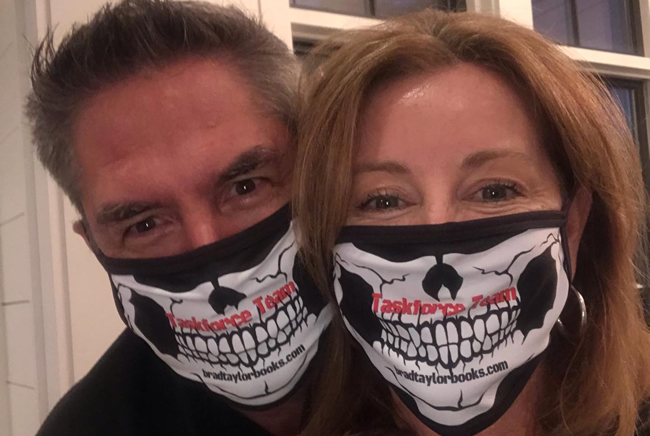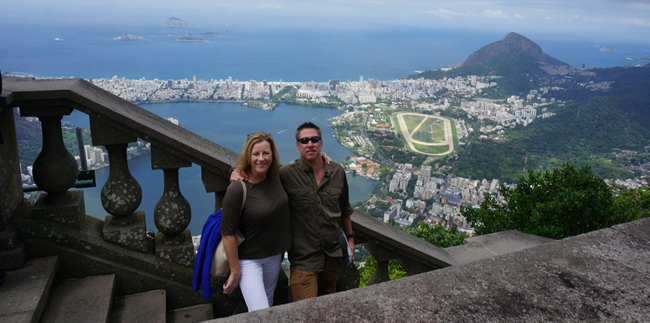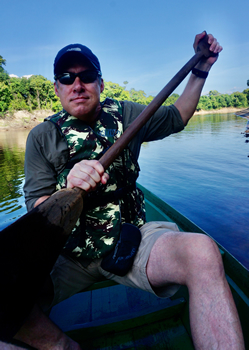

On The Cover: Brad Taylor by Esme Addison
It’s All in the Details
 By Esme Addison
By Esme Addison
There are certain types of books you read that are enhanced by the fact that the author has been there and done that. Police procedurals written by former law enforcement officers. Espionage thrillers written by former spies. Military thrillers written by former special forces soldiers…
AMERICAN TRAITOR is that book. Brad Taylor is that author.
A retired lieutenant colonel and veteran of the US Army Infantry and Special Forces, including eight years with the 1st Special Forces Operational Detachment, a.k.a. Delta Force, Taylor is a former assistant professor of military science at the Citadel and currently a security consultant on asymmetric threats for various agencies.
With that type of background, you can be assured the details in his military thrillers are accurate, whether we’re talking about the weapons his characters use, the operational tactics employed, or the psychology of the characters revealed. That type of authenticity lends a credibility to his writing that can only increase the enjoyment for readers who seek fast-paced, edgy, ripped-from-the-headline plots.
Taylor’s latest release, AMERICAN TRAITOR, explores treason against the looming threat of an overly ambitious China set against a scenic Australian landscape. Shades of Amazon’s Tom Clancy’s Jack Ryan meets the Australian TV series Pine Gap.
We’re immediately thrown into the world of Pike Logan, his wife Jennifer Cahill, and their newly adopted daughter, Amena, a Syrian refugee featured in a previous novel. And while I am a fan of military thrillers, I am new to the Pike Logan books, so AMERICAN TRAITOR was my introduction to this series. With that being the case, I was able to easily dive into the world of Pike and his Task Force colleagues. The pace is frenetic, the action immediate, and I wanted to finish the story in one setting.
Beginning the series at Book 15 left me intrigued by Pike’s backstory and his complex characterization. I also wanted to know how his girlfriend Jennifer became a fearless fighter who could stab a man in the eye with a wine opener… but back to Pike. He’s an American hero who perceives himself as the bad guy, an identity he deems necessary to get his important work done. He’s saving the world, after all, by any means necessary.
Taylor recently sat down with The Big Thrill to discuss keeping up with security risks in iRobot’s Roomba, China’s Belt and Road Initiative, and his inspiration for writing AMERICAN TRAITOR.
Hi, Brad. Thanks for taking the time to chat with me. Being new to the series, one of the first things that stuck out to me was Pike’s given name, Nephilim. The word is typically described as a giant or a fallen angel referenced in the Bible. Would you share your reasons for giving Pike this name?
Pike’s parents were new-age hippies, and they thought the name Nephilim would convey onto him strength for the very reasons you state. To them it was mystical. To him, it was hated. He refuses to use it, relying on his call sign Pike, but it shaped him into what he is.
When AMERICAN TRAITOR begins, the focus is on Pike as a dad. He has adopted a teenage girl, a Syrian refugee. What made you decide to turn Pike into a father? How does your own role as a father play into writing this storyline?
Amena came from three novels ago, appropriately named Daughter of War—which is one of my best, and in which she is a central—actually THE central—character. I really like that manuscript and everything in it, but at the end of the day Amena now exists, and I had to put her in the Pike Logan universe. I couldn’t just have her disappear, since readers would have asked, “What happened to Amena?”
On the other hand, I couldn’t have her tagging along with Pike and Jennifer on operations all over the world. I toyed with the idea of having her die at the end of Daughter of War, but I just liked her too much. I didn’t have it in me to do that, even as I realized I’d created a huge complication. I decided to go with it, which is what you’re seeing in AMERICAN TRAITOR—although she was also in the previous book, Hunter Killer. I’m going to have to figure out what to do with her. I’m thinking of starting the next book off at a funeral from a tragic hit and run. Just kidding. No way would I do that now.
As for being a father of two daughters, yes, that came into play. Mainly because it made it easier to get into a 13-year-old girl’s head.

Taylor and his wife, Elaine—familiar to readers as the DCOE, or Deputy Commander of Everything—model the masks they sell to benefit Special Operations Warrior Foundation.
Ever since I worked as a cleared export license analyst for the Navy and Marine Corps, I have been fascinated with military technology. The depth of knowledge you share in this arena is amazing. Would you discuss how you decide what technologies and weapons to include in your novels? How do you research to provide all of those great details?
I spend an inordinate amount of time keeping up with current technology and weapons, receiving news feeds from all over the world on new technologies or zero-day hack vulnerabilities, along with contacts I have that keep me abreast of the latest threat vectors. It’s literally almost a full-time job. Sometimes I see something that I’ll definitely factor in the book—while other times I’ll hit a roadblock of what I’m going to do to solve a problem and refer back to a piece of technology I’ve learned about. Or actually used. For instance, in Hunter Killer, I needed to bug a room and had read about a hack of the Alexa smart speaker—and so I used it.
In AMERICAN TRAITOR, the biggest example would be the iRobot Roomba, which uses machine learning to determine a floor plan and then stores that floorplan in the cloud—which would be perfect for an assault plan. I have a Roomba, and couldn’t believe what it was asking me permission to do. I told iRobot no on that, but figured others had said yes. So I used it.
When I lived in Okinawa as a Marine Corps spouse, I began graduate study in International Relations, with a concentration in East Asian foreign policy, so I was particularly interested in AMERICAN TRAITOR’s plot. A book I still have on my shelf from that time period is James Kynge’s China Shakes the World, and it warned of China’s future global ambitions in 2006.
Fourteen years later, China’s influence on America’s entertainment industry and their Belt and Road Initiative in Africa, Australia, and beyond is alarming to anyone who reads about it, and it seems like a pretty obvious strategy, and yet there doesn’t seem to be much political resistance, which can be frustrating.
Why did you decide to include this topic in your plot? What do you want readers to take away from the real-life knowledge you’ve shared in the acknowledgments section of AMERICAN TRAITOR, like how China prevented the NBA from playing games in their country?
It’s actually been brewing for a few years. In fact, decades. There was a paper written in 1998 that got some attention in the West, but not nearly as much as it should have. It was called “Unrestricted Warfare” and was written by two colonels in the People’s Liberation Army. The point of it was to determine how to defeat a near-peer competitor like the United States without full-on war. They knew that a direct military confrontation would result in defeat and looked at other ways to win, in the absence of overt hostilities. That stuck with me, but I hadn’t really given the thought of using China in a book until I was conducting research in Lesotho, Africa, for Operator Down.
I traveled to the country’s government center, which was brand new with some areas still under construction. On the still-under-construction walls were instructions for the workers—what I assumed were the usual, “wear a hardhat” type stuff, but it was written in Chinese. I asked my guide why there were Chinese instructions when we were in Africa. She said China was footing the bill for the complete reconstruction of Lesotho’s government center. When I asked why, she said, “No reason. They just want to help.”
From my own research into Lesotho—in fact, the premise of Operator Down—I knew that it was rich in rare earth minerals and diamonds, and found the explanation hard to believe. Inherently, I knew China wanted something in exchange—they just weren’t saying it out loud. Yet.
It was my first real-world exposure to China’s Belt and Road Initiative, whereby China seeds its tentacles through the world ostensibly out of good will, but in reality to control. At the time, it was a side note, because Operator Down had nothing to do with China, so I let it go. And then China just kept appearing. So I decided to write about it.
As far as what I want the reader to know about China, really, all I want them to do is enjoy a good story. I never set out to write a story with a hidden theme, but in this case, it’s real. China is expanding the Belt and Road Initiative throughout the world, using both hard power and soft power. Hard power includes building up rock atolls in the South China Sea along what they call the “Nine Dash Line,” basically claiming that those bits of rock are now the forward line of Chinese sovereignty located on the other side of the sea. Nobody—including the United Nations – believes it’s legal, so China uses soft power, which, in a word, is economic.
Someone in the NBA supports Hong Kong in its fight for democracy against China and China stops the NBA from playing inside the country—a multi-million-dollar loss. What happens? Lebron James chastises the people complaining because it’s hurting the NBA. [Dreamworks] wants to sell the movie Abominable in China? In order to do so, one of the maps in that animated picture must portray the nine-dash-line, instead of the boundaries the entire world recognizes. The new Top Gun movie is coming out, and in the trailer Tom Cruise puts on his iconic leather jacket with the patches, only this time, it’s a little different. In the original movie, he had a flag of Taiwan on it. In this one? It’s gone. It’s insidious, but real.

Taylor and his wife, Elaine, at the top of Mount Stanserhorn, Switzerland, where they were conducting research for Daughter of War in October 2017.
Napoleon famously said, “Let China sleep, for when she wakes she will shake the world.” Interesting how that quote is still relevant today, and AMERICAN TRAITOR is timely. With that being said, it seems like there is much fodder for additional thriller plots in Asia. Do you plan on setting more books in the region? Anything in particular you want to cover?
I wrote The Widow’s Strike—which you ask about below. That was set in Hong Kong, Macau, Thailand, and Singapore. If I do return to that region, as for what it would cover, I have no idea. World events will determine where my focus lies in the future.
If we can discuss a previous book of yours for a moment. . . The fourth book in the Pike Logan series, The Widow’s Strike, covers a GMO virus that gets in the wrong hands. Considering the global pandemic, do you plan on revisiting that type of story—one in which Logan could hopefully prevent a pandemic? Or do you feel you adequately covered the subject?
Boy, that book came out six years too early, didn’t it? And Pike did prevent a pandemic. I’m actually patting myself on the back about the research for that one, because in this case there’s a person who’s intentionally infected and has to get to a deployment point without infecting anyone else. How does she do it? She wears a mask everywhere she goes and social distances, locking herself in her hotel room each night and eating only room service with disposable silverware. She became a microcosm of what we’re living now.
As for writing another book about a pandemic, no damn way. I’m sick of the thing and have absolutely no interest in writing about it. Pike prevented a global pandemic in The Widow’s Strike. Enough said about that. I’d rather be on the cutting edge of threats than writing about one that everyone’s literally living.
What’s next for Pike Logan?
While doing research for Ring of Fire in Rome, I stumbled across this fascinating organization called the Knights of Malta—the only organization that has international status as a state, its own passports, and a seat at the United Nations—but owns no territory. I’ve been waiting to use them in a book for years, and now I will.
- Between the Lines: Rachel Howzell Hall - June 30, 2022
- On the Cover: Zarqa Nawaz - May 2, 2022
- International Thrills: Kate Quinn - March 31, 2022



